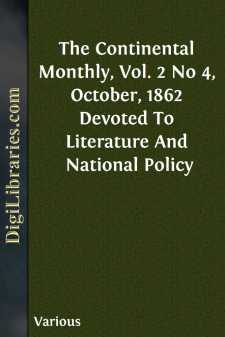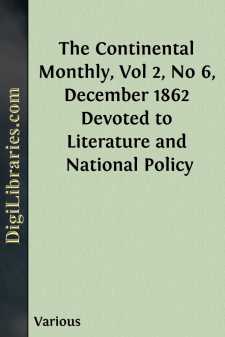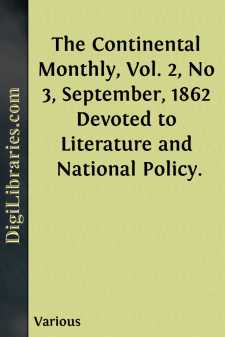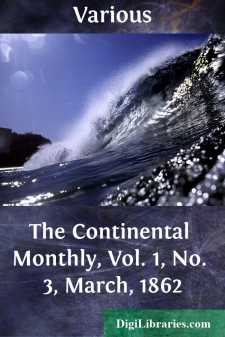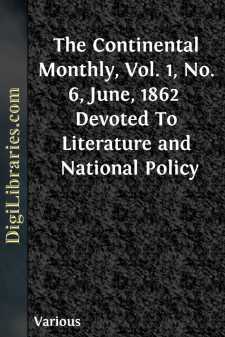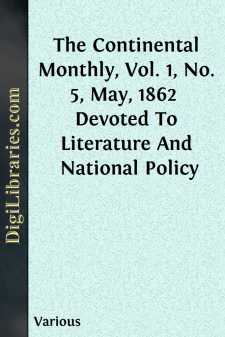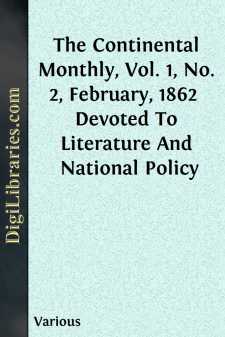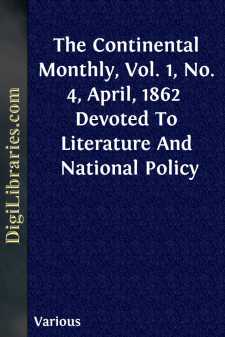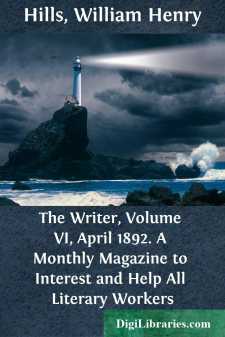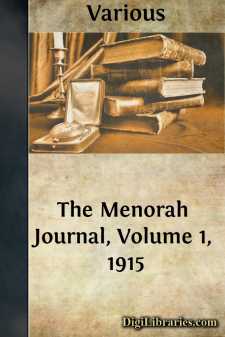Periodicals
- Art 27
- Children's periodicals 59
- Entertainment 5
- Food/Wine 2
- Games/Humor 455
- General
- Health 1
- History 53
- House/Home 1
- Regional 62
- Science/Nature 118
- Transportation 10
General Books
Sort by:
by:
Various
'THE CONSTITUTION AS IT IS—THE UNION AS IT WAS.' This has been a pet phrase, in certain quarters, ever since the rebellion broke out. The men who use it are doubtless well aware of the prodigious power of such cries adroitly raised. The history of their influence over the unreflecting masses in all ages would be one of the most curious chapters in the history of human nature. The phrase has...
more...
by:
Various
THE UNION. III. On the 10th of April last, upon the recommendation of the President of the United States, Congress offered pecuniary aid to such States as would gradually abolish slavery within their limits. The colonization, from time to time, of the manumitted slaves, with their consent, by the Government, beyond our boundaries, was also contemplated as a part of the system. By the President's...
more...
by:
Various
HENRY THOMAS BUCKLE. The death of Henry Thomas Buckle, at this period of his career, is no ordinary calamity to the literary and philosophical world. Others have been cut short in the midst of a great work, but their books being narrative merely, may close at almost any period, and be complete; or others after them may take up the pen and conclude that which was so abruptly terminated. So it was with...
more...
by:
Various
Southern Aids To The North. Perhaps the most difficult question at present before the American people is that so often and so insolently put by Southern journals, and so ignorantly babbled in weak imitation of them by English newspapers, asking what, after all, in case of a victory, or even of many victories, can we do with the revolted provinces? The British press, prompt to put the worst construction...
more...
by:
Various
THE CONSTITUTION AND SLAVERY. There are two sections of the United States, the Free States and the Slave States, who hold views widely different upon the subject of Slavery and the true interpretation of the Constitution in relation to it. The Southern view, for the most part, is: 1. The Constitution recognizes slaves as strictly property, to her bought and sold as merchandise. 2. The Constitution...
more...
by:
Various
What Shall We Do With It? The first blood that was shed in our Revolutionary struggle, was in Boston, in March, 1770. The next at Lexington, in June, 1775. The interval was filled with acts of coercion and oppression on the one side and with complaints and remonstrances on the other. But the thought of Independence was entertained by very few of our people, even for some time after the affair at...
more...
by:
Various
OUR WAR AND OUR WANT. Can this great republic of our forefathers exist with slavery in it? Whether we like or dislike the question, it must be answered. As the war stands, we have gone too far to retreat. It clamors for a brave and manly solution. Let us see if we can, laying aside all prejudices, all dislikes whatever, discover an honest course, simply with a view to preserve the Union and insure its...
more...
by:
Various
The War Between Freedom And Slavery In Missouri. It is admitted that no man can write the history of his own times with such fullness and impartiality as shall entitle his record to the unquestioning credence and acceptance of posterity. Men are necessarily actors in the scenes amid which they live. If not personally taking an active part in the conduct of public affairs, they have friends who are, and...
more...
WALT WHITMAN IN EUROPE. With the death and burial of Walt Whitman passes away the most picturesque figure of contemporary literature. It is true that in England the name of the poet is more familiar than his poetry, and that students of literature are more conversant with the nature of his writings than are the mass of general readers; yet the character of the man and the spirit of his compositions...
more...
by:
Various
The Menorah By Theodor HerzlTranslated from the German by Bessie London PouzznerDEEP in his soul he began to feel the need of being a Jew. His circumstances were not unsatisfactory; he enjoyed an ample income and a profession that permitted him to do whatever his heart desired. For he was an artist. His Jewish origin and the faith of his fathers had long since ceased to trouble him, when suddenly the...
more...


